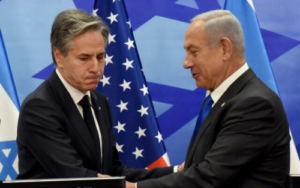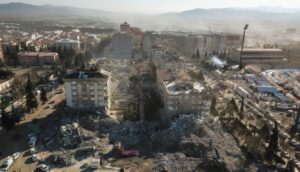
The National Interest Foundation Newsletter
Issue 179, February 17, 2023
Welcome to our NIF Newsletter. In this week’s headlines: we analyze the effects settlement expansions have on the two-state solution, investigate conflicts of interest between the Saudi government and Trump and Kushner, and look into the economic impact of the earthquake in Turkey and Syria.
Israeli Settlements Disrupt Chances of Peace

The United States may need to reassess its support of the two-state solution. (Photo from AFP)
The Expansion of Israeli Settlements is Ending Any Chance of the U.S. Favored Two-State Solution
The Palestine-Israel conflict has been escalating at an extreme rate. This occupation has had a devastating impact on Palestinians living in the West Bank and Gaza. Recently, Israel’s far-right administration implemented legislation that legalized nine illegal settler outposts in the occupied West Bank. This move was seen by the Palestinian Authority (PA) as an act of war against Palestinians. According to Israeli Prime Minister Benjamin Netanyahu, this will not be the last encroachment into illegal settlements. These acts continue to obstruct any progress toward a peaceful resolution to the conflict and have made the two-state solution all but impossible. One of Israel’s staunchest and at times only ally, the United States, has not yet taken a position on the authorization of Israeli outposts. However, the US ambassador expressed opposition to the creation of settlements last month. The Biden administration has made clear it opposes settlements in the region. Despite this opposition, the American government has done little to stop them from being created.
The Israeli government and military impose limitations and barriers in the West Bank, restricting mobility and access to Palestinians in their territories as well as others visiting there. The Israeli people’s patrol of population registration is a key tool used to limit travel. Israel records all new births and uses them to determine who is Palestinian and who is not, something which they have no right to do. In parallel with the new regulations that state that if two people living in Palestine marry and one is not from Palestine but has lived and worked there for 20 years, that person is no longer a resident and cannot live there. However, people visiting Israel have much more ease of access. This allows Israel to decide who may and cannot stay in Palestine. This is apartheid, plain and simple. Different sets of laws are used to govern Palestinians. These restrictions on movement in Palestine not only make it more difficult for Palestinians to exist in their own country but also makes it easier for Israelis to create new settlements. By simply declaring them a non-citizen of Palestine, they can be easily removed under Israeli law.
There is growing concern about the ultra-nationalist extreme religious figures in charge of civil administration in Israel. Netanyahu’s administration does not care about respecting international law or the rights of the Palestinian people and essentially seeks to seize all of the regions under Israeli military control. These are the very discriminatory legal systems that Israel has implemented adding more fuel to the flame of the already tense relations between Palestine and Israel. After a lengthy period of bloodshed, families being divided, and a lack of progress toward a more hopeful future, there is a consensus that the two-state solution is becoming increasingly unpopular. Israeli settlement expansion has also led to the displacement of Palestinians from their homes and land, which has contributed to tensions and resentment. Finally, other world actors are seeing that the two-state solution may not be the most just or equitable solution to the conflict, as it would allow Israel to maintain its occupation of Palestinian territories and perpetuate inequality between Israelis and Palestinians. Due to these and other reasons, there has been a trend in recent years toward looking at different approaches, such as the one-state solution or other systems that emphasize equality, justice, and human rights.
In efforts to address the Israeli-Palestinian conflict, the United States has played a significant role, particularly by supporting a two-state solution that would establish a separate Palestinian state alongside Israel. The question of whether this strategy is still useful or whether new solutions ought to be sought has been under contention lately. Israeli settlements have made the two-state solution impossible because if they continue, there will not be a Palestinian state at all, but rather a connection of Israeli settlements with enclaves of Palestinians in between. The United States can still play a constructive role by supporting efforts to promote dialogue and find a peaceful resolution to the conflict but must re-evaluate the strategy it is employing.
Conflict of Interest in Saudi Deal with Trump, Kushner

Evidence points to a conflict of interest between MBS, Trump, and Kushner. (Photo from Reuters)
Conflict of Interest Concerns Grow as Investment Fund Overseen by Mohammed bin Salman Continues to Profit Former President Trump and His Senior Aide Jared Kushner
Recent business dealings between Saudi Arabia and Former President Trump and his son-in-law and former senior aide Jared Kushner have raised alarms among many watchdog organizations. There have been growing indicators that the massive amount of funds given to Trump and Kushner was a way of paying back a debt owed for favorable policies to the Saudi government, particularly policies that helped Crown Prince Mohamad bin Salman (MBS). Both Trump and Kushner’s businesses suffered during the former’s presidency. Kushner’s latest major business dealing had left his family firm needing a $1.2 billion bailout, while Trump’s businesses had suffered from a combination of financial mishandling and bad publicity because of the association with his and his supporter’s actions while he was in the White House. Luckily for both of them, MBS came to their aid, arranging for each of them to receive massive amounts of money to revive their businesses.
The day after Trump left office, Jared Kushner created a company called A Fin Management and used it as a springboard to create Affinity Partners, a private equity fund. Kushner received a 2-billion-dollar contribution from a sovereign wealth fund chaired by MBS. This was despite his lack of experience, which the Saudis were more than aware of. Confidential minutes of a meeting among the chairs of Saudi’s Public Investment Fund also revealed that 4 members of the 5-person panel were not in favor of the investment, citing Kushner’s inexperience and the fact that the Public Investment Fund would be bearing most of the risk. MBS overruled them and pushed the deal through. The transfer of funds was recently revealed because Kushner employed a strategy commonly used by equity firms to avoid reporting their funding sources to the Securities and Exchange Commission. Trump was also not left out of the cash infusion from MBS. Shortly after he left office, the Saudi sovereign wealth fund-backed LIV Golf series began to hold tournaments on his gold courses. The Saudis footed the entire bill, and it is estimated that the Trump organization made hundreds of millions of dollars. The Trump Organization also secured a deal with a Saudi real estate company that plans to build a Trump hotel as part of a $4 billion golf course.
All of these lucrative business deals came after Trump’s presidency, in which he implemented many policies that helped MBS rise through the ranks of Saudi politics to become the Crown Prince. One of the things that propelled MBS’s standings was by scheduling Trump’s first presidential trip to Saudi Arabia to meet with him. New revelations reported by the Washington Post indicate that Kushner was the driving force pushing Trump to prioritize Saudi Arabia despite his top advisors’ reservations. Trump believed that the prince “owed” him because he “saved” MBS after the CIA reported that he was responsible for the killing of opinion columnist Jamal Khashoggi.
While these specific actions by Trump and Kushner are some of the most egregious of the type, it is important to note that this type of conflict of interest is not limited to these instances. This is just the symptom of a wider problem in American politics. U.S. officials have a history of cashing in favors. There is a long list of former US military officials, the highest ranking of which was General Jim Mattis, who served as a Secretary of Defense under Trump, that have also taken high-paying jobs consulting with foreign militaries. The UAE and Saudi Arabia are the most common hirers of former military personnel. The difference with these is that the officials, before accepting their positions, must first receive approval from the United States government. This oversight is non-existent for the former president and members of Congress. Elected officials also tend to outperform the average American in the stock market, often investing in companies related to the committees they are on. The committees in the legislature often learn about confidential information that is beneficial when it comes to stock trading before the public. It is also not uncommon for politicians, upon retiring or losing reelection, to receive high-paying jobs with companies. The companies that hire these former politicians often have benefitted from policies passed by them when they were in office.
An investigation has already been launched by congressional Democrats to ensure any wrongdoing is brought to light. Legislation must be passed to ensure that this trend of government officials trading in political favors for money comes to an end. The legislation should include some type of government watchdog institution and laws limiting what government officials can do with their money, including banning stock trading among sitting members of congress. Lobbying also needs to be closely monitored.
Earthquake’s Economic Impact

Turkey’s fragile economy will likely affect recovery efforts. (Photo from AFP)
The Economic Impact of the Earthquake in Turkey and Syria
The economic impact of natural disasters and conflicts can be significant and can extend the suffering of affected communities long after they have concluded. Turkey and Syria were both recently shaken by a 7.8 magnitude earthquake, and the suffering will likely be compounded by their already fragile economic situations. In Syria, the ongoing civil war has resulted in significant economic challenges, including high unemployment, inflation, and a significant decline in GDP. The country’s infrastructure has also been severely damaged, which has affected the ability of businesses to operate and has limited access to basic services such as healthcare, water, and electricity. Prior to the disaster, Syrians were already grappling with a fuel shortage, a cholera outbreak, and mounting food insecurity. With the vast majority of northwest Syria’s population, which includes at least 2.6 million displaced people, dependent on humanitarian aid. Civilians in these areas are essentially trapped. They lack the necessary resources to relocate, are unable to cross into Turkey, and fear what will happen if they try to move to government-controlled regions. This dire situation has created a complex set of challenges that must be addressed to help those most in need. The destruction of critical infrastructure and the disruption of economic activity can lead to a long-term decline in economic growth, which can impact the well-being of individuals and communities for years to come. Similarly, in Turkey, the recent earthquake has caused significant damage to buildings and infrastructure, including hospitals, schools, and homes.
The Turkish Enterprise and Business Confederation has estimated that Turkey may face a staggering cost of up to $84.1 billion due to the recent earthquake, which was the country’s most devastating in almost 100 years. The report outlined the anticipated expenses, with $70.8 billion expected for the repair of thousands of homes, $10.4 billion in national income loss, and $2.9 billion in lost working days. Another estimate by a government official has put the figure at over $50 billion. The earthquake, which had a magnitude of 7.8, has resulted in a combined death toll in Turkey and Syria that is rapidly approaching 40,000. As the focus of the response now shifts from rescuing survivors to providing essential resources such as shelter, food, and psychosocial care, it is likely that the death toll will increase even more in the coming days. Rebuilding housing, transmission lines, and infrastructure, as well as providing short, medium, and long-term shelter for the hundreds of thousands left homeless, are expected to be the primary costs. As Turkey grapples with the aftermath of the earthquake and prepares for upcoming elections, the country is facing significant economic challenges. In the 10 affected provinces, a state of emergency has been declared for three months, while the central bank has postponed loan payments.
The cost of rebuilding and repairing these structures will be significant, which can place a significant strain on the country’s economy. The loss of income and livelihoods for those affected by the earthquake will also result in long-term economic impacts. In addition, the destruction of infrastructure such as roads, bridges, and airports can limit access to markets and opportunities, which can further hinder economic growth. In both Syria and Turkey, those who were already facing economic and social challenges are likely to be hit the hardest.
Human Rights Watch has highlighted the United Nations Security Council-mandated cross-border aid mechanism in Syria as inadequate, in light of the slow humanitarian response to the recent earthquakes that severely impacted opposition-held northwest Syria. On February 13, 2023, Syrian President Bashar al-Assad authorized UN aid deliveries to pass through two more border crossings to the besieged northwest from Turkey, but this decision came over a week after the February 6 earthquakes. As a result, millions of people in opposition-controlled areas of northwest Syria have been without critical search-and-rescue reinforcements and lifesaving aid since the earthquakes struck. The destruction of critical roads and infrastructure, warehouses, and coordination systems needed to organize aid deliveries through the only Security Council-approved UN aid corridor from Turkey into the affected areas further complicates situations. Urgent alternatives have been needed. The U.N. relief director stated during a visit to Syria on Monday that the phase of rescue is “coming to a conclusion”, and that the focus is now shifting to shelter, food, education, and psychosocial care. The UN took more than 6 days to acknowledge the assistance needed following the initial earthquake, which is an unacceptably long period of time given the urgency of the situation.
In such instances, every second counts. The “crisis inside a crisis” is making it harder to distribute relief, according to a UN official in Syria. Starting in 2011, the Syrian conflict escalated from the brutal crackdown on peaceful demonstrators to the involvement of armed groups from foreign nations. Sivanka Dhanapala, the Syria representative of the UN High Commissioner for Refugees (UNHCR), said “As many as 5.3 million people in Syria may have been left homeless by the earthquake.” As a consequence of the ongoing conflict, there has been extreme internal division, and approximately half of Syria’s population before the war has been displaced from their homes, with a significant number seeking refuge in Turkey. This internal division is an integral contributing factor to the UNHCR having difficulties “rushing aid” to Syria’s severely damaged regions. Dhanapala adds, “There are 6.8 million people already internally displaced in the country. And this was before the earthquake.” In a promising move towards alleviating the humanitarian crisis in Syria, the Syrian government has announced its decision to collaborate with the UN and other humanitarian organizations to facilitate aid deliveries to rebel-held areas outside its control.
The UN has faced significant challenges in attempting to meet the dire humanitarian needs of those living in northwest Syria, exacerbated by obstruction of aid delivery from various parties to the conflict. Both the Syrian government and anti-government armed group Hay’at Tahrir al-Sham (HTS), which controls a portion of northwest Syria, as well as the Turkey-backed Syrian National Army (SNA), which holds territory across northern Syria, have impeded the delivery of much-needed aid to the most severely affected regions of northwest Syria. This obstruction has created additional barriers to assisting those already struggling to cope with the consequences of the earthquake and other crises, further underscoring the importance of finding solutions to these challenges.
Enter the text or HTML code here
